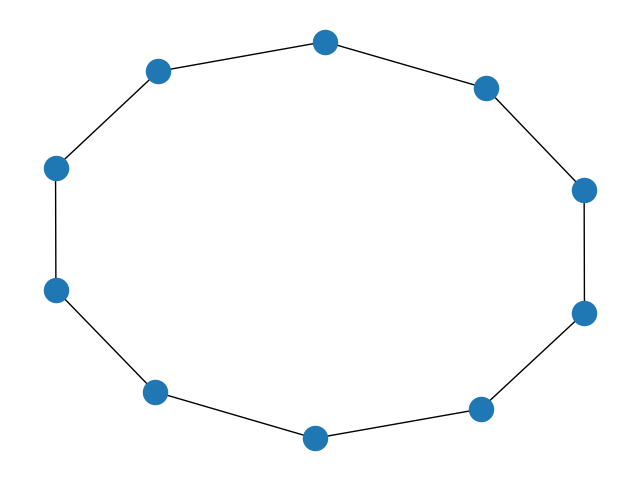circulant_graph#
- circulant_graph(n, offsets, create_using=None)[source]#
Returns the circulant graph \(Ci_n(x_1, x_2, ..., x_m)\) with \(n\) nodes.
The circulant graph \(Ci_n(x_1, ..., x_m)\) consists of \(n\) nodes \(0, ..., n-1\) such that node \(i\) is connected to nodes \((i + x) \mod n\) and \((i - x) \mod n\) for all \(x\) in \(x_1, ..., x_m\). Thus \(Ci_n(1)\) is a cycle graph.
(
Source code,png)
- Parameters:
- ninteger
The number of nodes in the graph.
- offsetslist of integers
A list of node offsets, \(x_1\) up to \(x_m\), as described above.
- create_usingNetworkX graph constructor, optional (default=nx.Graph)
Graph type to create. If graph instance, then cleared before populated.
- Returns:
- NetworkX Graph of type create_using
Examples
Many well-known graph families are subfamilies of the circulant graphs; for example, to create the cycle graph on n points, we connect every node to nodes on either side (with offset plus or minus one). For n = 10,
>>> G = nx.circulant_graph(10, [1]) >>> edges = [ ... (0, 9), ... (0, 1), ... (1, 2), ... (2, 3), ... (3, 4), ... (4, 5), ... (5, 6), ... (6, 7), ... (7, 8), ... (8, 9), ... ] >>> sorted(edges) == sorted(G.edges()) True
Similarly, we can create the complete graph on 5 points with the set of offsets [1, 2]:
>>> G = nx.circulant_graph(5, [1, 2]) >>> edges = [ ... (0, 1), ... (0, 2), ... (0, 3), ... (0, 4), ... (1, 2), ... (1, 3), ... (1, 4), ... (2, 3), ... (2, 4), ... (3, 4), ... ] >>> sorted(edges) == sorted(G.edges()) True